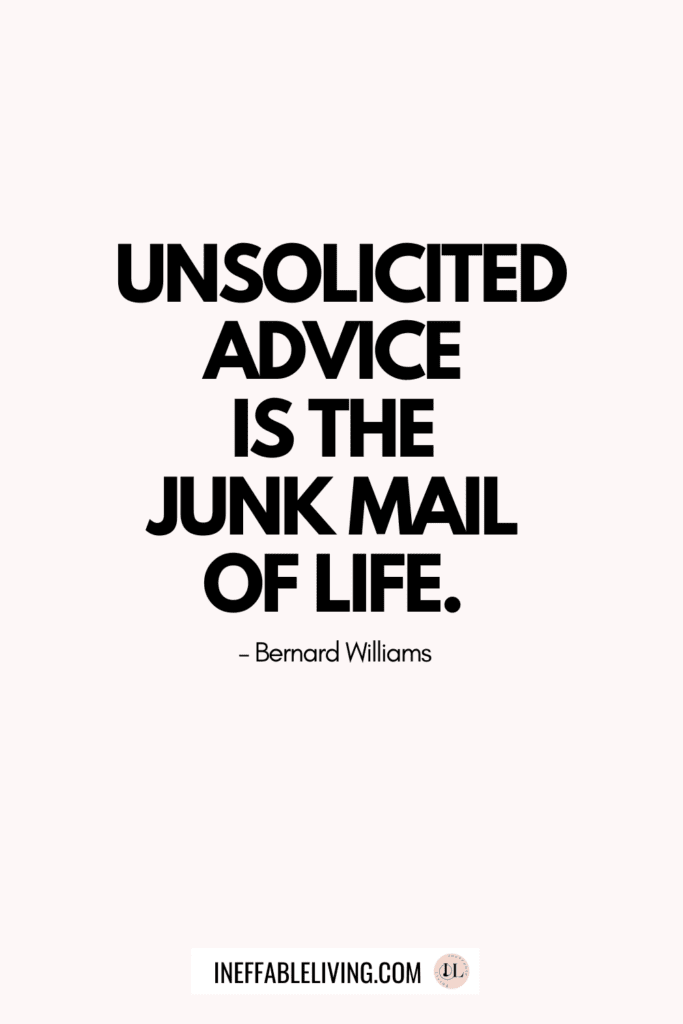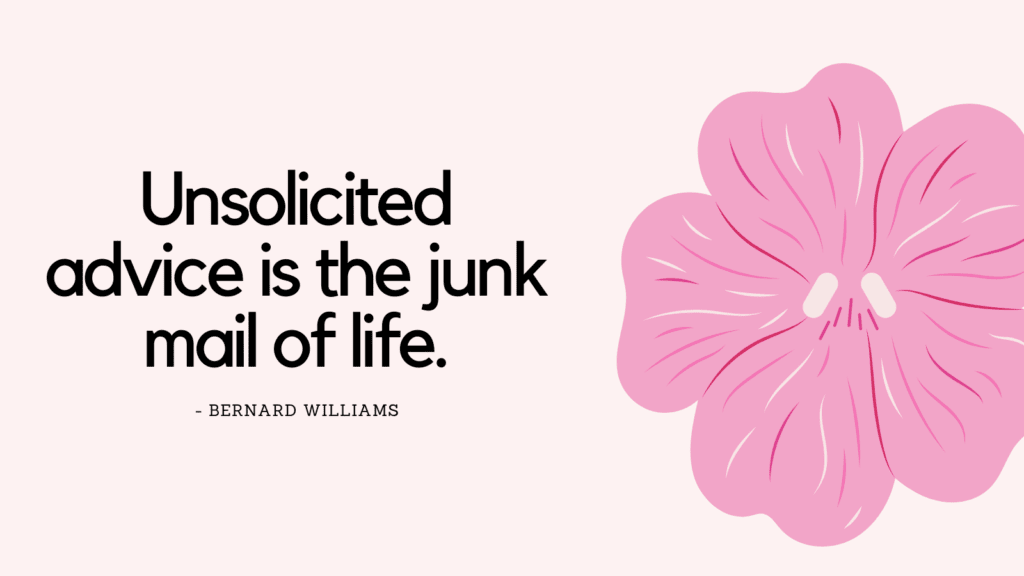This post contains some of the best unsolicited advice quotes.
What Is An Unsolicited Advice?
Unsolicited advice refers to giving someone advice or suggestions without being asked for it.
It is when a person offers guidance, opinions, or direction to another person who has not expressed an interest in receiving them.
Unsolicited advice can come from a well-intentioned individual who wants to help, but it can also be perceived as intrusive, unwanted, or irritating by the recipient.
What Type of Person Gives Unsolicited Advice?
Usually, people who give unsolicited advice tend to be controlling or overbearing.
They may lack boundaries and feel entitled to share their opinions or suggestions without being asked for them.
They may believe that they have more knowledge or expertise in a particular area than the person they are advising.
However, it’s also common for people who mean well to give unsolicited advice because they genuinely want to help others.
Unsolicited Advice Quotes
1. “Advice is seldom welcome; and those who want it the most always like it the least.” — George Chapman
2. “I don’t like to give advice. I like to give people information because everyone’s life is different, and everyone’s journey is different.” — Dolly Parton
3. “Unsolicited advice is always self-serving.” – Amy Dickinson
4. “Before you open your mouth, ask yourself, “Is it in the best interest of the relationship for me to give this unsolicited advice?” If not, then keep quiet.” – Christy Largent
5. “When you’re pregnant, people feel like they can come up and give you unsolicited advice. When I was nine months pregnant, this one woman came up and she said, I have one word for you: epidural. And I was like, Oh my God, thanks. But we already picked a name.” – Bonnie McFarlane
6. “To offer a man unsolicited advice is to presume that he doesn’t know what to do or that he can’t do it on his own.” – John Gray
7. “Unsolicited advice is usually more about the needs of the giver than the receiver.” – Charles F. Glassman

8. “Unsolicited advice is the junk mail of life.” – Bernard Williams
9. “People who are overweight don’t want unsolicited advice. Guess what. We know we’re fat. We live in homes with mirrors.” – Al Roker
10. “Generally speaking, when a woman offers unsolicited advice or tries to help a man, she has no idea of how critical and unloving he may sound to him.” – John Gray
11. “There is a time to provide advice and offer an opinion, and there is a time not to. Don’t be too quick to offer unsolicited advice. It certainly will not endear you to people.” – Harvey MacKay
12. “I never give advice unless someone asks me for it. One thing I’ve learned, and possibly the only advice I have to give, is to not be that person giving out unsolicited advice based on your own personal experience.” – Taylor Swift
13. “Never offer unsolicited advice. The receiver might not know that you are smarter than him.” – C.J. Langenhoven
14. “It is a sign of arrogance to be mad at someone for not acting as per your advice, especially if it was unsolicited.” – Mokokoma Mokhonoana
15. “Women don’t like advice. They don’t want you to fix their problems, they just want you to listen.” — Shawn Wayans
Related: How To Validate Someone’s Feelings Without Agreeing? (+Examples of Validating Statements)
16. “When nobody interferes with what you wear and how you wear, you are living in a civilised country at least on the matter of clothes! Happiness and freedom are often the same thing!” ― Mehmet Murat ildan
17. “These are peculiar times. It is not worth interfering with anybody. No one knows how to talk nicely! People talk in a way that gives others a ‘headache’.” ― Dada Bhagwan
18. “People nowadays are in business of minding other’s business.” ― Kartik Mehta
19. “If you think it cannot be done, please don’t interfere or interrupt the rest of us trying to do it.” – R.J. Intindola
20. “People have nothing to do and therefore they interfere with the life of others. I don’t want to interfere with the life of others.” – Vaslav Nijinsky
21. “Interfere with the reality of my world, and you therefore take the very life and heart out of my will.” – Josiah Royce
22. “Detachment is never letting someone else control how we think, feel, or behave.” – Karen Casey
Related: Top 23 Toxic Positivity Quotes (+FREE Validating Statements Worksheet)

How to Deal with Unsolicited Advice?
Dealing with unsolicited advice can be challenging and potentially detrimental to our emotional well-being.
While some advice may be well-intentioned, it is crucial to establish boundaries and protect our mental health.
1. Reflect on Intentions
Recognize that most individuals offering advice are well-intentioned and genuinely want to help.
Try to approach the situation with an open mind and consider the intentions behind the advice before responding emotionally.
Remember that individuals may offer advice based on their own experiences and perspective.
2. Evaluate the Source
Consider the credibility and expertise of the person providing advice.
Reflect on their knowledge, experience, and qualifications in the relevant area.
While well-meaning, advice from unqualified or uninformed sources may not be helpful or applicable to your situation.
Related: How To Respond To Invalidation? Top 7 Things You Can Do
3. Apply Selective Listening
Instead of dismissing or immediately embracing unsolicited advice, practice selective listening.
Extract any potentially useful insights or perspectives from the advice while filtering out what does not align with your values, goals, or beliefs.
Focus on learning from the advice without feeling obligated to implement it.
4. Set Boundaries
Establish clear boundaries when it comes to unsolicited advice.
Communicate assertively and directly with the person offering advice, expressing your appreciation for their concern while kindly asserting your preference to handle the situation independently.
Setting boundaries is vital for preserving your autonomy and emotional well-being.
Related: Best 10 Books On Validation
5. Seek Validation Internally
Develop confidence in your own decision-making abilities by seeking validation within yourself.
Trust your intuition, knowledge, and experience when making choices.
Recognize that you have the capability to assess situations and make informed decisions without always relying on external input.
6. Practice Self-Compassion
Remind yourself that unsolicited advice does not reflect a personal failure or weakness on your part.
Practice self-compassion by accepting that you are doing the best you can and that it is okay to seek guidance selectively or not at all.
Treat yourself with kindness and understanding during challenging situations.
Related: Self-Compassion Quiz (+FREE Self-Compassion Resources)
7. Seek Supportive Connections
Surround yourself with supportive individuals who respect your boundaries and provide constructive feedback when sought.
Connect with trusted friends, family members, or mentors who offer guidance when invited, allowing you to cultivate a network of individuals who understand and respect your need for autonomy.
8. Shift Your Perspective
View unsolicited advice as an opportunity for growth and learning rather than as an intrusion.
Embrace different perspectives and consider whether there may be value in the advice, even if you ultimately choose not to follow it.
Adopting this mindset can help reduce defensiveness and increase openness to new ideas.
Related: Assertive Anger: What It Is & How to Practice It
9. Redirect the Conversation
When faced with unsolicited advice, redirect the conversation to a different topic or steer it back toward a subject that feels more comfortable for you.
Politely but firmly assert your desire to focus on other areas of conversation, demonstrating your boundaries while maintaining a positive and respectful interaction.
10. Practice Assertive Communication
Assertive communication is key when handling unsolicited advice.
Express your gratitude for the person’s concern while confidently asserting your autonomy and decision-making capabilities.
Utilize “I” statements to clearly articulate your perspective and feelings without belittling or dismissing the advice-giver’s intentions.
Related: Top 5 Tips On How To Be Assertive Without Being Rude

Conclusion
Handling unsolicited advice can be challenging, but by applying these strategies, you can protect your emotional well-being while still being open to valuable insights.
Remember to set boundaries, trust your own judgment, seek supportive connections, and practice self-compassion as you navigate through situations where unsolicited advice arises.
By preserving your emotional well-being, you can make decisions that align with your needs, goals, and values.



